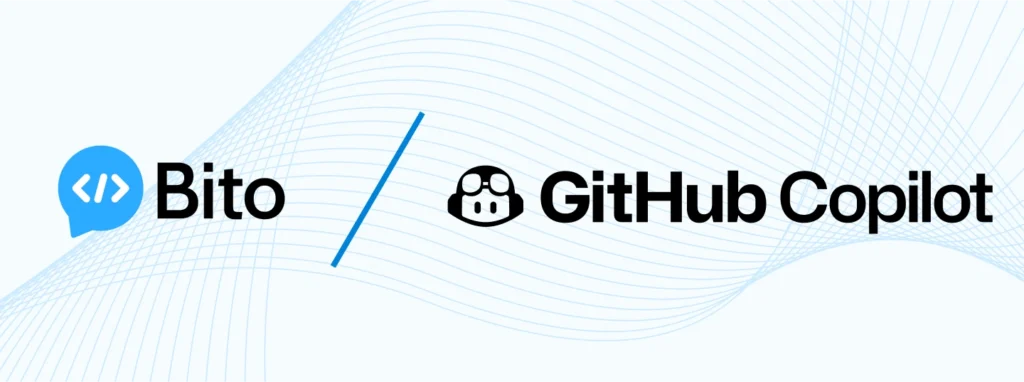Get high quality AI code reviews
- 90+ point analyses
- AI that understands your code
- Bito vs GitHub Copilot
Bito vs GitHub Copilot
AI-powered tools are reshaping how developers write and review code. GitHub Copilot dominates the code generation space, while Bito focuses exclusively on AI-powered code reviews.
While GitHub Copilot offers basic code review features, Bito’s specialized focus delivers significantly superior review capabilities through deep codebase understanding and comprehensive issue detection.
This comparison of Bito vs GitHub Copilot specifically examines the code review capabilities of both tools to help you understand why specialized tools like Bito provide more value for code quality assurance. We’ll explore how Bito’s in-depth codebase analysis and targeted approach to code reviews delivers higher-quality suggestions and more accurate issue detection than Copilot’s general-purpose review features.
Whether you are a solo developer or part of a larger team, understanding these differences can help you choose the right tool to elevate your coding experience.
What people are saying about Bito
Prashant Mahajan
Founder and CTO, Privado
Understanding purpose of Bito vs GitHub Copilot
- Generates code from comments and context
- Provides real-time code completions
- Supports 30+ programming languages
- Integrates with popular IDEs (VS Code, JetBrains, Vim)
- Enables “vibe coding” – intuitive, flow-state programming
- Analyzes entire codebases for issues
- Detects bugs, security vulnerabilities, and performance problems
- Provides specific fix suggestions
- Integrates with Git workflows (GitHub, GitLab, Bitbucket) as well as available within code editors (VS Code, Cursor, and all JetBrains IDEs)
- Generates comprehensive review analytics
Teams use Bito to automate manual code reviews, catch issues before production, and maintain consistent code quality across projects.
Choosing the right AI code reviewing assistant
While GitHub Copilot is a great tool overall, Bito may be the better option if you need an AI that understands your entire codebase, offers automated AI code reviews, and provides analytics to see how the tool is benefiting your team.
Key differentiators of Bito
Agentic codebase intelligence
Bito uses an agentic approach that dynamically explores your entire codebase like an experienced developer would. This reduces false positives while uncovering complex problems that span multiple files.
Whereas GitHub Copilot can only see the current file plus a small window of recent files — like a developer with very short memory who can’t understand broader system implications.
Advanced issue detection
Bito performs deep analysis to identify logic errors, security vulnerabilities, performance bottlenecks, and maintainability issues that human reviewers often miss. It catches subtle problems such as race conditions, SQL injection risks, algorithmic inefficiencies, and architectural violations.
On the other hand, GitHub Copilot only provides surface-level awareness for existing code. While it may suggest minor improvements, it lacks the capability to detect high-severity or critical issues.
Interactive code review agent
With Bito, you can chat directly with the AI Code Review Agent to ask questions, request alternative solutions, or clarify recommendations in real time. This accelerates development cycles by turning code review into a two-way, collaborative process.
Whereas GitHub Copilot provides one-way suggestions without the ability to explain, justify, or adapt feedback based on your queries.
Customizable review rules and guidelines
Bito adapts to your team’s unique coding standards by supporting custom review rules and guidelines. Teams can provide feedback on pull requests to train the Agent or define rules via the dashboard to enforce consistency across the codebase.
Whereas GitHub Copilot cannot enforce or adapt to your team’s coding conventions—it only provides generic suggestions.
Integrated feedback from dev tools
Bito integrates feedback from the tools you already rely on, including static analysis, vulnerability scanning, linters, and secret detection. Out-of-the-box integrations such as FBInfer and OWASP Dependency-Check deliver deeper insights and more secure code reviews.
Whereas GitHub Copilot works in isolation, without combining intelligence from external analysis or security tools.
Side-by-side comparison

Here’s a side-by-side comparison of Bito and GitHub Copilot. While GitHub Copilot does include a basic code review capability, it remains limited to surface-level suggestions.
Bito, on the other hand, is purpose-built as an AI Code Review Agent. It understands the entire codebase, applies advanced analysis to detect critical issues, and delivers actionable recommendations. This makes Bito more effective for teams seeking high-quality, reliable, and scalable code reviews—going beyond what Copilot can offer.
Code review capabilities
| Pull request summaries |
Automated, detailed analysis with issue breakdown |
Basic summaries (Enterprise only) |
| Bug detection |
Advanced pattern recognition across entire codebase |
Basic bug analysis capabilities |
| Security analysis |
Dedicated vulnerability scanning with fix suggestions |
No security-focused analysis or recommendations |
| Performance optimization |
Identifies bottlenecks with specific improvements |
No performance analysis of existing code |
| Fix suggestions |
Specific code changes with implementation details |
Only general guidance |
| Codebase context |
Full repository analysis with cross-file relationships |
Limited to current file and recent context |
| Git integration |
GitHub, GitLab, Bitbucket with automated workflows |
GitHub integration only, manual processes |
| Review analytics |
Comprehensive team metrics |
No code review analytics or reporting |
| Automated workflows |
Triggers on PR creation or code push |
Requires manual initiation for any analysis |
| Custom rules and guidelines |
Configurable standards and organizational policies |
No customization for review criteria |
| Interactive agent |
Two-way collaboration—ask questions, request alternatives, clarify fixes |
No interactive review capability, only one-way suggestions |
| Tool integrations |
Integrates with static analyzers, vulnerability scanners, linters, and secret detection tools |
Works in isolation without external tool feedback |
Security and privacy
| Compliance certifications | SOC 2 Type II certified | SOC 2 Type 1 certified |
| Secure and encrypted data transmission |
Yes |
Yes |
| No AI model training on user code |
Yes |
can be allowed or disallowed in the settings |
Pricing details
| Free plan |
Yes |
Yes. However, the code review feature is not available in the free plan. |
| Paid plan | $15 per user per month (billed monthly) | $19 per user per month |
| Enterprise plan | $25 per user per month (billed monthly) | $39 per user per month |
Real-world usage: how development teams actually use these tools
GitHub Copilot in daily development
GitHub Copilot shines during active coding sessions when developers need to translate ideas into working code quickly. Picture a developer building a new API endpoint – they type a comment describing what the endpoint should do, and Copilot generates the entire function structure, including parameter validation, database queries, and response formatting.
The tool excels when working with unfamiliar libraries or frameworks. If you’re using a new JavaScript framework for the first time, Copilot can generate component boilerplate, suggest proper hook usage, and even help with configuration files based on patterns it has learned from thousands of similar projects.
Copilot also proves invaluable during learning phases. When exploring a new programming language, developers can describe what they want to accomplish in plain English, and Copilot translates those intentions into idiomatic code. This accelerates the learning process by showing practical examples rather than requiring developers to dig through documentation.
The “vibe coding” phenomenon occurs when developers enter a flow state where Copilot anticipates their intentions so well that coding becomes almost conversational. You start typing a function name, and Copilot completes not just the signature but the entire implementation, often matching exactly what you had in mind.
However, Copilot’s suggestions aren’t always perfect, especially for complex business logic or domain-specific requirements. Developers need to review and modify generated code carefully, which can break the flow state when suggestions are significantly off-target.
Bito's role in quality assurance
Bito operates differently – it works behind the scenes to ensure code quality without interrupting the development flow. When a developer creates a pull request, Bito automatically analyzes all changes and generates a comprehensive review within minutes.
Consider a scenario where a team is working on an e-commerce platform. A developer adds a new payment processing feature, and Bito’s analysis might reveal that the implementation doesn’t properly validate credit card numbers, uses weak encryption for storing sensitive data, and has a potential race condition that could process the same payment twice.
Instead of waiting for a senior developer to catch these issues during manual review (which might take hours or days), Bito flags them immediately with specific recommendations. It might suggest implementing the Luhn algorithm for credit card validation, recommend using established encryption libraries instead of custom implementations, and show how to implement proper transaction locking.
For teams with junior developers, Bito serves as an automated mentor. It catches common mistakes like SQL injection vulnerabilities, inefficient database queries, or violations of established design patterns. Each finding includes educational context, helping team members understand not just what to fix but why the fix improves the code.
Large development teams particularly benefit from Bito’s consistency. Human reviewers have different expertise areas and might miss issues outside their specialties. Bito applies the same rigorous standards to every review, ensuring that code quality remains consistent regardless of which team member performs the initial review.
Making the strategic choice
When Bito delivers maximum value
Bito becomes essential for teams where code quality directly impacts business outcomes. Financial services companies processing sensitive transactions, healthcare organizations handling patient data, and infrastructure teams maintaining critical systems all benefit from Bito’s rigorous analysis.
Organizations with large development teams find Bito particularly valuable for maintaining consistency. When you have dozens of developers contributing to the same codebase, automated review ensures that quality standards remain consistent regardless of individual reviewer availability or expertise.
Companies with compliance requirements appreciate Bito’s systematic approach to identifying security vulnerabilities and ensuring adherence to coding standards. The detailed analytics help demonstrate due diligence to auditors and stakeholders.
When GitHub Copilot provides better ROI
Individual developers and small teams focused on rapid development benefit more from Copilot’s productivity enhancements. Startups building MVPs, developers learning new technologies, and teams working on internal tools often prioritize development speed over rigorous code review.
Copilot excels in educational environments where the goal is learning and experimentation rather than production-quality code. The immediate feedback and code generation capabilities accelerate the learning process for new developers.
Teams with experienced developers who already maintain high code quality standards might find Copilot’s productivity benefits more valuable than automated quality assurance.
The combined approach: why many teams use both
Progressive development teams increasingly adopt both tools to optimize their entire development lifecycle. They use Copilot during active development to accelerate coding and learning, then rely on Bito to ensure that increased development velocity doesn’t compromise code quality.
This combination proves especially powerful for teams scaling rapidly. Copilot helps new team members become productive quickly, while Bito ensures that their contributions meet established quality standards. The result is faster onboarding without sacrificing code quality.
The investment in both tools often pays for itself through reduced debugging time, fewer production issues, and improved developer satisfaction. Teams report that the combination allows them to move fast without breaking things – the holy grail of modern software development.
Bottom line
GitHub Copilot and Bito address different challenges in modern software development. Copilot solves the “how do I write this code faster” problem, while Bito tackles “how do I ensure this code is production-ready.”
Your choice depends on your primary constraint: if development velocity is your bottleneck, Copilot provides immediate productivity gains. If code quality issues cause production problems or slow down your team, Bito’s automated review capabilities deliver more value.
The most successful teams recognize that both speed and quality matter. They use Copilot to accelerate development and Bito to maintain standards, creating a development workflow that’s both fast and reliable.
